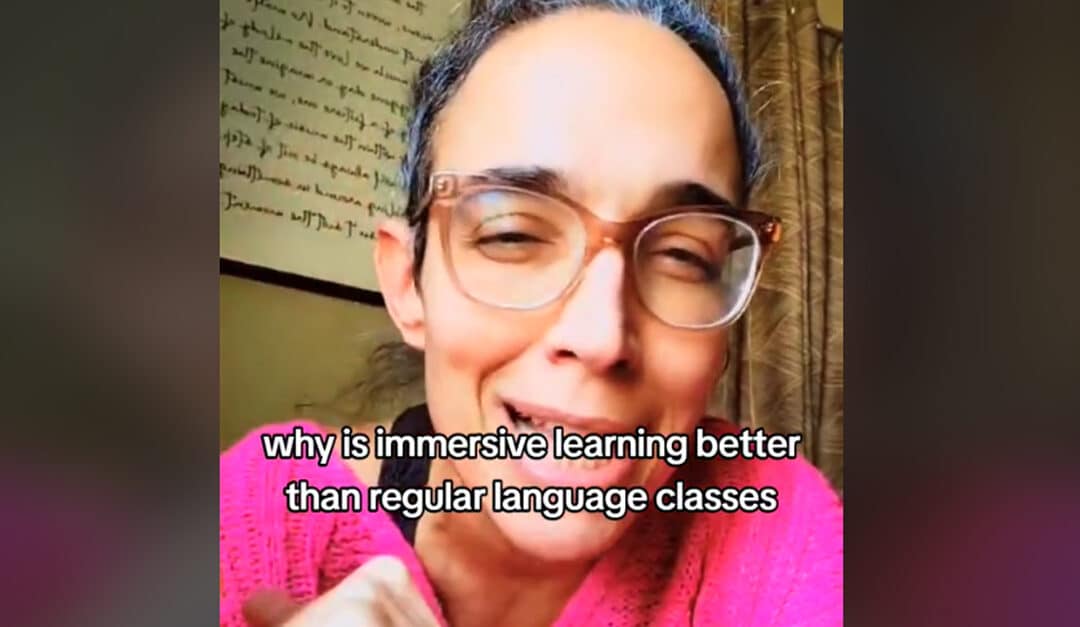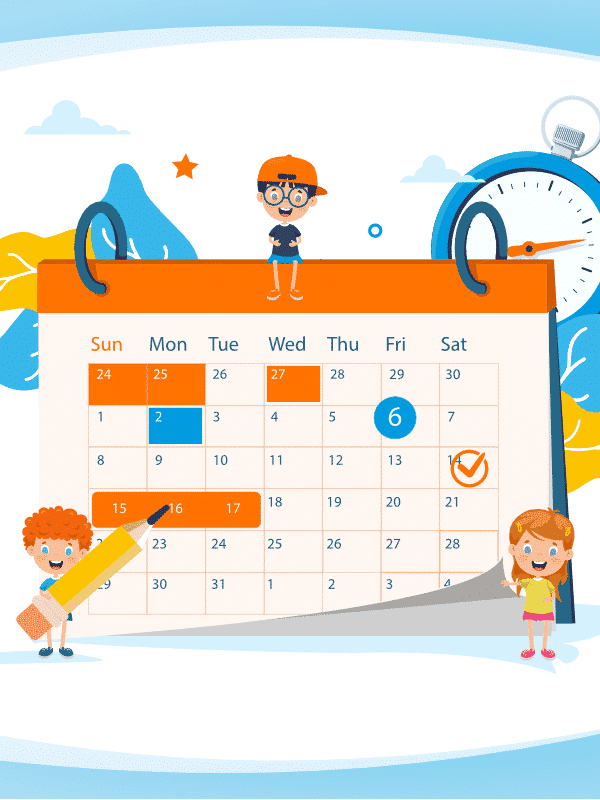@trufluencykidsspanish Today our founder shares her take on immersive langugage vs. regular langugage classes. #nosabokids #bilingualkids #edutok #AprendeEnTikTok #aprendeespañol #latinamoms #raisingbilingualkids #bilingualproblems
♬ Legends Are Made - Sam Tinnesz
Hi, there! How’s it going today? Have your kids learned any new words? Please tell us which one! You want a secret? We have the best way children can learn a new language, including many new words! Have you heard of immersion?
Experts and many parents of bilingual children agree that immersion works well for kids, and so do we. But why is that?
The Language Immersion Journey
Well first things first, if children start their immersion journey as very young kids or even babies, like they do with their native language, they probably won’t have the pressure of passing an exam. So instead of having to study and feeling forced to memorize to get an A+, they can learn in a more awesome way, by playing and experimenting with the sounds of the language.
As we grow up, we can feel more pressure from our parents, our teachers and even ourselves to excel at class. But if we learn from kids, it’s more likely adults won’t make us feel like we have to be language experts. They understand kids are just learning about the world and that language is a journey.
Just think about it: what happens when a baby mispronounces a name? Adults usually laugh and find it cute. I mean, a lot of nicknames for adults come from a word that a baby couldn’t pronounce correctly once!
Do you have any family members who people call a fun nickname or a cute diminutive because a baby started it all? Tell us in the comments!
And even when they correct a baby, adults don’t feel like they have to spend hours teaching the baby the new word; they know they’ll eventually get it.
The best of this is that without the pressure, they’ll learn to love the language!
Language Immersion Isn’t as Scary
Another important aspect is that if the children are very young, they’ll probably won’t fear learning a new language, unlike adults. As we grow we tend to be more nervous about participating in classes, talking to natives, and making mistakes.
But babies and young kids are learning many different things already, language is just another one. Most likely, they also haven’t had bad experiences that have led them to fear learning. So, they’ll feel happy to listen to the language and try to repeat it.
What we must be careful about is not to scare them ourselves. As parents, we can sometimes unintentionally project our fears into them. If we want to encourage them, let’s talk positively about the process of language learning.
If your kids do tell you they’re afraid, don’t worry, it’s also normal, especially for those children over the age of three. The good news is that there are ways to help them calm down. If they tell you they’re scared of making mistakes, don’t act like you’re going to judge them.
Instead tell them that even if they get something wrong, it’s okay, because that happens sometimes in a learning process. But also make sure to remind them that they’ll get better.
Practicing the Language at Home
Another important thing you can do is help your kids keep practicing their target language at home. Talk to them, play games, watch movies and sing, all in their target language. Watching you being involved in their journey will make them feel happy and safe while learning, so their fear will decrease.
But even if they’re not scared, this is an essential step for all kids learning a second language, because practicing at home, in their everyday environment will reinforce your kids’ knowledge. This is also why parent participation is one of the things that makes immersion work well for children.
Developing Brains and Language Immersion
But of course, it’s not just that. There’s a brain advantage that kids have that helps them learn languages better through immersion. Wanna know what is it? Their brains haven’t developed fully yet!
This means that they are forming neural connections very, very fast. And this is what helps them develop in different areas, including language.
So, if they start learning a new language from a young age, especially since babies, most likely they’ll get the right connections to learn the language like they’re natives and not forget what they’ve learned. The knowledge will be stuck in their brains. Of course, they’ll still have to keep practicing.
You don’t even need to enroll them into grammar classes yet, just create an environment in your babies’ target language. Talk to them and play with them in that language, like you do with their mother tongue. That’s what immersion is about. That way, their young brain will start picking up words and sounds naturally.
Of course they won’t become experts immediately, but their brain will already have the tools that will help your kids keep on learning the language as they grow up and even learn other languages more easily later in life.
When we grow our brains have already developed and though it doesn’t mean we can’t learn new things, it can be more difficult as adults. For example: as we grow, our brain notices the sounds that we use more in our everyday language, and so it starts to reinforce those sounds and leave aside the ones we don’t use a lot in our mother tongue.
That’s why as adults we can’t notice all the different nuances in other languages’ sounds, making it more complicated for us to speak fluently in a second language, not have an accent and understand everything.
That’s why it’s crucial we immerse our children in their second language as soon as possible. Take advantage of their brains while it’s in the development process!
Language Immersion Feels Natural
This takes us to a very important point. Immersion is great, because it feels like any other everyday task. Like we’ve said before, this method is very natural to kids, whose brain is growing and discovering the world.
It’s not about sitting down to study. It’s about picking up the language through common activities that might seem comfortable, but are not really, because they’re done through a new language. Nonetheless, it’s a joyful process, because it’s about doing children’s favorite things in their target language.
It’s also about exploring with it. Kids will hear a word or a sentence and try to imitate it. Kids will see a person pointing at something while repeating a specific word and will figure out that’s the name of the thing they’re pointing at.
Kids will hear a word that strikes their curiosity and repeat it a million times. And it works, repetition is magic for them! Kids will express their thoughts and feelings to you using a new expression they learned. Children are made for this kind of learning!
Introducing Children to Other Cultures
Another amazing point on why immersion is good for children is the fact that very young kids don’t have any prejudices nor malicious intentions. We as adults are the ones that can make them good people with appreciation for the many different languages, cultures and traditions around the world.
Instead of turning them into mean people. So, it’s the perfect age to immerse them in the language of our choice and its culture. After all, both things come together. If we want them to truly know the language, they must understand the culture.
That’s what immersion does. Who knows? When they go into school, they might make many foreign friends, because of their cultural awareness and respectful attitude.
Bilingualism and Math
Did you know that being bilingual helps for having good math skills? And not only that, music and language are also related, because both share brain pathways.
This means that if your kids go into language immersion and get the benefits of it, it’ll also help them improve in other academic subjects. The best of all is that it will happen without notice; it’s not like you’ll put your kids to study math, music and language at the same time.
Nonetheless, all those skills will help build and improve each other. Who would’ve thought that language immersion learning would take our kids such a long way in their different subjects at school? Especially subjects some people find super hard, like math! What a great benefit, huh!
Immersion Works!
See? Immersion works well for kids in terms of learning the language more easily and faster, without the barriers that we as adults have, but also in terms that it’ll help them polish other skills and grow as people.
If you’re convinced this is the way you want your children to learn Spanish and get all the benefits of it, check trufluencykids.com. There, you’ll get all the information on our Spanish classes… with native teachers, by the way.
Subscribe if you learned something new and see you in the next video!


